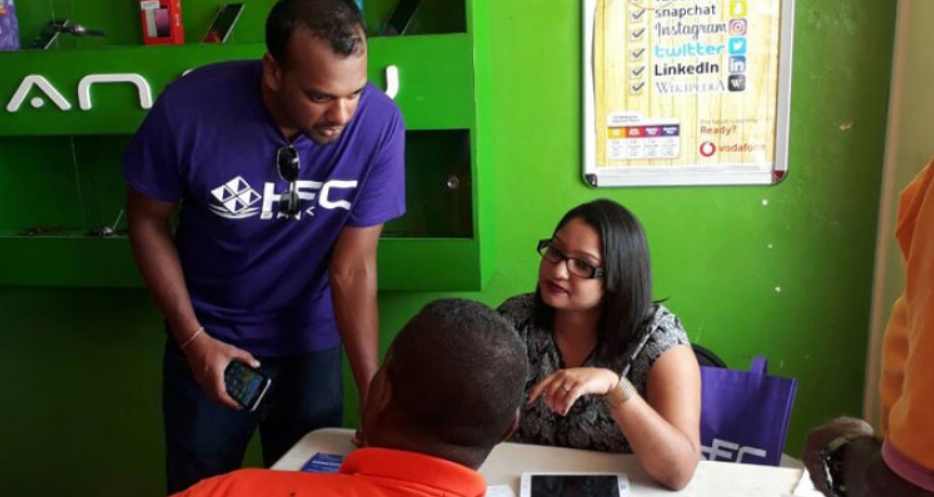How the Reuben James Summerlin Scholarship May Contribute to the Future of Digital Identity in Fiji
Tags
Akash Anand is an up and coming project officer with HFC Bank in Fiji and a key player in extending the reach of digital finance in his country.
The cost of setting up infrastructure in remote areas means that many communities have never had access to formal banking services. Through a new partnership with the mobile network operator Vodafone and UNCDF’s Pacific Financial Inclusion Programme (PFIP), Akash’s team at HFC have been able to expand their agent network tenfold and bring access to financial services to previously marginalised communities significantly expanding the bank’s customer base in the process. Having been encouraged to apply by a PFIP team member, it came as no surprise to his colleagues and family when he was awarded the 2019 Reuben James Summerlin Annual Scholarship.
The Reuben James Summerlin Annual Scholarship was launched in 2016, in memory of PFIP’s programme manager Reuben Summerlin. The scholarship honours Reuben’s passion for capacity building and education while contributing to PFIP’s vision of enabling low-income households to gain access to good quality, affordable and sustainable financial services and financial education. It is awarded to exceptional employees from PFIP’s partner institutions, such as Akash, to help them develop their knowledge and skills in digital financial inclusion.
Akash is passionate about his work and sees great potential for digital finance initiatives in Fiji: “despite various development challenges, Fiji has a more favourable financial inclusion rate than most developed countries. This makes Fiji a good testbed for introducing innovative financial services, whether it’s through banking or insurance-related products.” He identifies the lack of digital infrastructure as an important barrier to higher usage rates that is gradually being addressed through sustained investment in telecommunications. As the digital financial services market develops further in Fiji there is an increasing need for technical specialists in digital finance.
The RJS scholarship contributes to addressing this by helping digital finance practitioners in the Pacific develop the tools and skills to capitalise on the opportunities presented by improved connectivity. It does so by covering tuition fees for the Chartered Digital Finance Practitioners (CDFP) Certification offered through the Digital Frontiers Institute (DFI). DFI is a non-profit educational organization founded in 2015, which is linked to Tufts University and funded by, among others, the Omidyar Network and the Bill and Melinda Gates Foundation.
Before the course, Akash had worked extensively on projects related to digital finance but confesses that his knowledge of the broader field was quite limited and had advanced significantly since he attended university. His approach to the course was “to keep an open mind and take each course as a completely new subject”. Many of the concepts outlined in the courses proved to be real “eye-openers” for Akash as he “came to realise that many business concepts have changed over the years and are also applied differently in the field of Digital Finance.”
 Akash Anand and colleague assist a customer opening a savings account in Korovou, Tailevu. © HFC Bank
Akash Anand and colleague assist a customer opening a savings account in Korovou, Tailevu. © HFC Bank
The two course topics that Akash previously knew little about, but that he most enjoyed were Digital Identity as well as Artificial Intelligence in Finance. There is currently a project in place to issue a National Digital ID to all Fijian citizens and the Digital Identity course “really provided an in-depth look at all the major Digital ID implementations around the world and the mechanisms surrounding them.” While digital identity is currently more a relevant topic, he admits that “Artificial Intelligence is an area of personal interest for me which is why I really enjoyed this particular course. The course dwelled on how machine learning can be used to improve financial services and assist with achieving greater financial inclusion especially in less developed countries.”
Akash is looking forward to applying what he has learned in the course, “particularly in the area of digital identification for faster onboarding of clients and how Artificial Intelligence can be used in loan processing for faster access to credit for MSMEs.” Akash’s newfound technical know-how means that he can start laying the foundation needed to integrate these tools into his current field of Agency Banking and may be able to help prepare HFC to take advantage of Fiji’s push to issue Digital IDs soon.ure of Digital